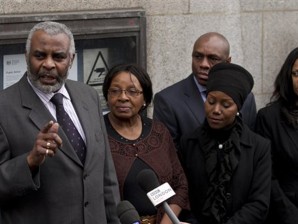Father urges men to name accomplices in UK racist murder

Neville Lawrence, left, the father of murdered black teenager Stephen Lawrence, speaks outside the Central Criminal Court in London, Wednesday, Jan. 4, 2012. Neville Lawrence said he hopes that two men sentenced to prison for the murder will now identify other members of the gang. AP PHOTO/MATT DUNHAM
LONDON—The father of murdered British black teenager Stephen Lawrence urged the two men jailed on Wednesday for his son’s racist killing in 1993 to name their accomplices.
Speaking outside the Old Bailey court after the pair were sentenced to at least 14 and 15 years respectively, Neville Lawrence said the convictions were “only one step in a long, long journey” of seeking justice for his son.
“One of my greatest hopes is that these people have now realized that they’ve been found out,” he told reporters shortly after Gary Dobson, 36, and David Norris, 35, were sent to jail.
He expressed hope that they will “go and lay down in their beds and think that they weren’t the only ones who were responsible for the death of my son, and they’re going to give up the rest of the people.”
Stephen Lawrence, 18, was stabbed to death at a bus stop in Eltham, southeast London, in April 1993, in an unprovoked racist attack by a group of white youths that became one of Britain’s most notorious unsolved crimes.
Article continues after this advertisementThe police were strongly criticized for their handling of the case in a 1999 report that condemned them as institutionally racist and that was credited with sparking a major overhaul in the way police dealt with similar crimes.
Article continues after this advertisementDobson and Norris were among five men arrested in the days shortly after Lawrence’s murder, and Scotland Yard police chief Bernard Hogan-Howe pledged on Wednesday to continue searching for the rest of the teenager’s killers.
The victim’s mother, Doreen Lawrence, said she would welcome efforts to bring the other gang members to trial but did not hold out much hope.
“If it happens it will be good but as they didn’t collect the evidence they will have difficulty,” she told reporters outside court.
Dobson was sentenced to serve at least 15 years and two months while Norris was sentenced to at least 14 years and three months, after a jury found them guilty on Tuesday on the basis of new forensic evidence.